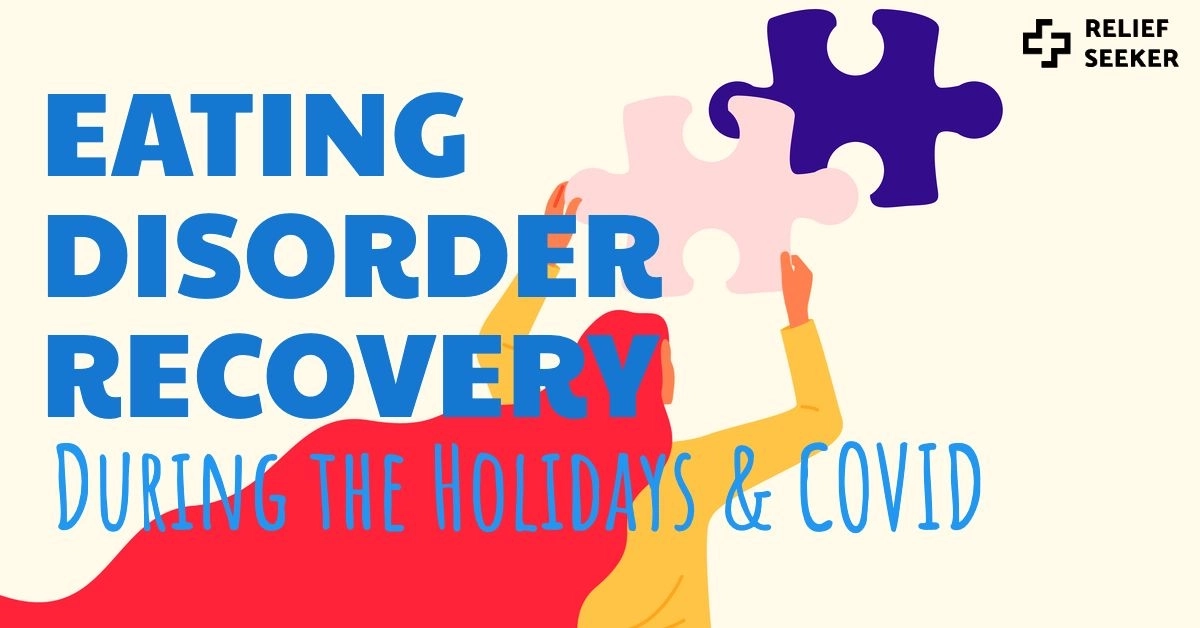Eating disorders will affect nearly 29 million Americans in their lifetimes, and they result in more than 10,000 deaths every year. Such disorders are categorized as mental illnesses and are the no. 2 cause of death among mental disorders.
COVID-19 has created an uptick in patients suffering from eating disorders as well as a rise in relapses, and the holiday season only exacerbates the situation. Eating disorder recovery during the holidays, and COVID isn’t easy, but luckily there are treatment programs and eating disorder support to help prevent relapse.
Types of Eating Disorders
The four main types of eating disorders are:
Binge eating disorder is categorized by eating large amounts of food at one time (usually as a coping skill to deal with emotions, trauma, or feelings of shame or depression).
Bulimia is a condition that is categorized by an obsession with weight loss. It’s marked by binge eating (eating large amounts of food) followed by purging or vomiting; sometimes, patients with bulimia also heavily restrict calories after binging.
Anorexia (or anorexia nervosa) is the restriction of food to prevent weight gain or lose weight due to an obsession with body image.
Calorie restriction is another form of anorexia (though it’s often not as severe). Patients who restrict calories often do so by eating very few calories per day or fast for a time period but don’t stop eating altogether.
Body dysmorphia isn’t an eating disorder per se, but it can lead to eating disorders. It’s a mental condition that is characterized by an obsession with a perceived physical flaw.
Causes of Eating Disorders
Researchers believe the most common causes of eating disorders include:
Genetics
Trauma/abuse
Personality traits
Mental health disorders
Some scientists believe that genetics may play a large role in eating disorders. If you have a relative that suffers from an eating disorder, you’re more likely to suffer from one yourself.
People that have suffered trauma or abuse often develop eating disorders, too. Such trauma and abuse may be body-image related (shaming by a parent, friend, or stranger), or it may not be related to body or weight at all.
Some people that suffer from such disorders simply use calorie restriction or binging as a means to wield control over their lives.
Many patients that suffer from such disorders also suffer from other mental health conditions, such as depression, anxiety, and obsessive-compulsive disorder (OCD).
Eating Disorder Symptoms/Eating Disorder Behaviors
Common symptoms and behaviors of patients suffering from eating disorders include:
Connecting self-esteem and diet adherence
Dental issues
Difficulties concentrating
Dizziness/fainting
Severe food rituals
Feeling cold
Frequent dieting
Hiding food
Hoarding food
Inconsistent menstrual cycles
Losing or gaining extreme weight
Mood swings
Muscle fatigue
Obsessing over food calories, weight, and portions
Obsessing over meal planning
Obsessing over working out
Preoccupation with body shape/size
Refusing to eat in front of others
Restricting calories
Skipping meals
Withdrawing from social situations
Eating Disorder Recovery During the Holidays
For people recovering from eating disorders, the holidays can be excruciating.
The months of November, December, and January can often spark depression, anxiety, and stress for anyone not suffering from an eating disorder. Add a focus on food, drink, overabundance, and stress-inducing behaviors, and these months become a perfect storm for an eating disorder relapse.
Why Are the Holidays So Hard for People With Eating Disorders?
While the holidays can be hard on anyone, they can be especially difficult for patients suffering from and recovering from eating disorders. Some of the big eating disorder triggers during the holidays include:
Extreme focus on food and drink
Too many social engagements
Focus on overconsumption
Lack of structure
Focus on Food
There is a massive focus on food in the months of November, December, and January (though for some, the focus may begin at Halloween with candy).
The Thanksgiving holiday tends to focus more on food than the other fall and winter holidays, as the dinner is the centerpiece of the event. Yet, December is also laden with holiday parties that include eating and drinking.
If you suffer from an eating disorder, the constant focus on food can be triggering. Party hostesses often check in to make sure everyone is getting enough food, and it’s not uncommon for friends and family to encourage eating at events.
And if your friends and family know about your eating disorder? They might start monitoring your food intake for you.
To top it all off, January tends to be the month that people start dieting — which can be another trigger for someone with an eating disorder. While the rest of the world is shedding those extra holiday pounds, it isn’t easy to sit back and avoid the fitness and diet blitz.
Friends, family members, and coworkers might even try to pressure others into joining a post-holiday fitness or weight-loss challenge.
More Social Engagements
There are simply just more social engagements during the holidays. Being around so many people (especially people you only see once a year) can be very triggering for some — especially if those people happen to be family.
If you use overconsumption or restriction of food and drink to calm your nerves, you may end up feeling triggered.
Overconsumption
There’s a focus on overconsumption during the holidays. We end up eating too much, drinking too much, and buying too much. All of this overconsumption can lead to stress and anxiety — and it can trigger not just eating disorders but also other mental health conditions too.
Lack of Structure
In the months of November and December, our schedules seem to disappear. We head to the office late, stay at work late, and stay out late. Our meal times are all over the place, and we can’t remember if we took our vitamins or not.
Life tends to get in the way during the holidays, and good habits are often replaced by less desirable ones.
This can lead to other mindless behaviors and coping techniques, such as overeating, binge eating, and calorie deprivation.
Preventing Eating Disorder Relapses During the Holidays
Luckily, there are actionable steps you can take to mitigate the probability of a relapse during the holidays. Setting boundaries, making a holiday plan, practicing self-care, and talking to a therapist specializing in eating disorders can all help reduce the likelihood of a relapse.
Make a Plan
Make a holiday plan to ensure your schedule doesn’t get too out of whack. If social engagements are triggering, limit yourself to just a few events. If being around certain people is triggering, limit your interactions with those people.
Try to set boundaries and practice self-care throughout the season to ensure you’re taking time to take care of yourself and your body throughout this stressful time.
Set Boundaries
Set boundaries with friends and family beforehand. Sometimes friends and family may feel disappointed if you decide you don’t want to participate in certain traditions or if you want to opt-out of some events altogether.
Don’t feel bad about leaving a party early, and set boundaries at your work if you’re expected to stay late to finish year-end requirements.
Explain what events you’ll attend beforehand and let loved ones know that your choices aren’t personal.
Practice Self-Care
It’s easy to forget about your basic needs during the holidays. Make a list of self-care practices that you need to stay sane and healthy during the holidays. Some practices may include meditation, light yoga, staying hydrated, or getting reflexology.
Talk to a Professional
Sometimes talking to a therapist can help you stay grounded during the holidays — and act as a lifeline when you need help fast.
Online therapy offers the same high-quality treatment as in-person therapy, just from the comfort of your home or office. Platforms like Talkspace connect you with therapists that specialize in eating disorders, seasonal depression, anxiety, and more. You can schedule video chats or message your therapist whenever you need a little extra support.
Join a Support Group
Support groups connect people with similar issues in a safe space. These groups are usually themed around a specific issue or condition (eating disorders, trauma, depression, anxiety, grief).
Online support groups like Wisdo can connect you with others dealing with similar issues. No need to commute to a common location to meet with your group members. You can meet online or just message back and forth as you wish. Members are classified as ‘going through it’ or ‘gotten through it’ to provide the best possible support for each other.
Eating Disorder Holiday Recovery Dos and Don’ts
If you don’t suffer from an eating disorder or aren’t recovering from one, you can make it easier on others by respecting boundaries.
Don’t: pressure others into eating or drinking at holiday parties.
Do: ask everyone how they’re doing or if they need anything.
Don’t: comment on others’ bodies or eating habits.
Do: thank people for coming to a party or mention they look nice.
Don’t: forget to practice self-care during the holidays and stick to a schedule.
Do: encourage your friends and family to take care of themselves and set healthy boundaries, too.
Eating Disorder Recovery During COVID
The holidays aren’t the only stressor that can lead to an eating disorder relapse. The breakout of COVID-19 has also created a stressful environment that has led to both relapse and new cases of eating disorders.
Find out why the pandemic has been so toxic for those with eating disorders and what you can do to prevent a relapse.
Why Is COVID Hurting Eating Disorder Recovery?
Patients that suffer from eating disorders often use food as a coping mechanism. The stress of living through a pandemic can trigger an eating disorder — as can life conditions during COVID-19 in general.
Some COVID-19 living conditions that may slow eating disorder recovery may include:
Hoarding mentality
An overabundance of shelf-stable foods
Lack of structure
Higher rates of depression
Living in isolation/close quarters with others
Preventing Eating Disorder Relapses During COVID
While we can’t control the number of toilet paper rolls available on grocery store shelves, we can take steps to create stability during these unstable times. If you’re worried about an eating disorder relapse, you may want to try to create some structure to your day, create boundaries with friends and family, and schedule virtual community and support into your daily schedule.
Create Structure Throughout Your Day
Life just isn’t normal right now. But we can still create some sort of normalcy in our days. Create a structure for each day, and try to stick to that schedule. Even though you can’t recreate your non-COVID lifestyle, creating structure can give you a sense of normalcy in these hard times.
Talk to a Mental Health Professional
Talking to friends and family is a great way to mitigate loneliness — but it can’t replace your relationship with your therapist. If you’re stuck at home, platforms like Talkspace can help connect you with a therapist specializing in eating disorders, depression, loneliness, anxiety, and more.
Schedule virtual video sessions or chat via text, video, or voice message.
Join a Support Group
Even though we’re in isolation, we’re not alone. Online support groups like Wisdo provide a safe space for people suffering from eating disorders to meet virtually and talk about their issues. Seasoned members are paired with newbies (kind of like sponsors in AA) to ensure everyone has a buddy that has ‘been through the fire’ and can offer advice and support to those suffering the most.
Create Boundaries in Your Home
If you live with others, create boundaries in your home. Create a ‘safe space’ or ‘time-out’ room where you can escape to if you need some time away from other members of your household. Vocalize your needs to your housemates (yes, even your children and spouse) and ask that they respect your boundaries.
Reach Out to Friends and Family
Create a virtual community with friends and family to stay sane — especially if you live alone. Loneliness is one of the leading causes of eating disorders, so making space to connect with others can prevent triggers.
You don’t need to suffer alone in isolation. If you need help, contact a therapist to schedule an online session. If you’re thinking of hurting yourself or someone else, call 911 or contact the National Suicide Prevention Lifeline at 800-273-8255, available seven days a week, 24 hours a day.


